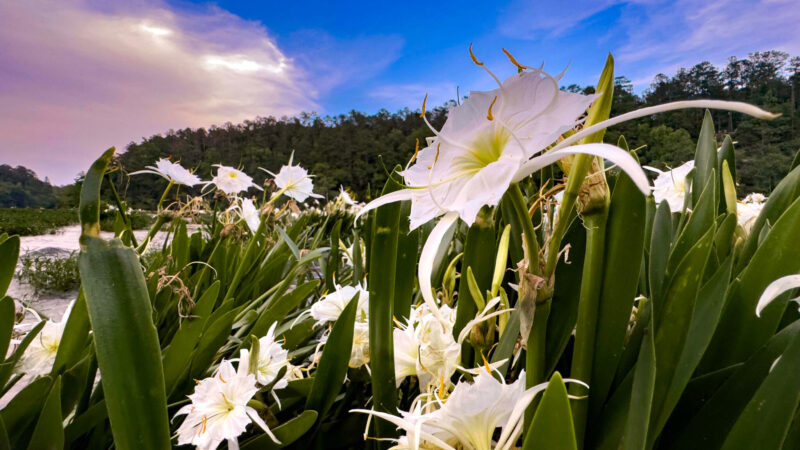A Song for the Cahaba River
This article originally appeared on Inside Climate News, a nonprofit, independent news organization that covers climate, energy and the environment. It is republished with permission. Sign up for their newsletter here.
By Lee Hedgepeth, Inside Climate News
WEST BLOCTON, Ala.—“The lilies have bloomed this season if you know where to go.”
It’s a line in Birmingham band I Declare’s newly released song “Cahaba,” and it’s the truth.
At the recent Cahaba Lily festival, you could hear the sacred Southern knowledge passing from one person to another.
“Where do you go? Have you been yet? Is the water low enough to see them?”
The lilies, a species endemic to the southeastern U.S., are named after Alabama’s longest free-flowing river, the Cahaba. They bloom boldly atop the jagged shoals that line the river’s bottom each year between Mother’s Day in May and Father’s Day in June.
This year, as is growing more often the case, an unusually rainy May has led to a less than ideal viewing season. But still, like clockwork, Alabamians have flocked to the Cahaba to see what they can.
“On the banks of the big river, watching nature’s finest show,” the song’s lyrics say. “It’s a biological marvel, a cesspool of teeming growth. A reflection of our survival in the water’s steady flow.”
It wasn’t always like this.
Dr. Larry Davenport is known as the world’s foremost expert on the Cahaba Lily, scientific name Hymenocallis coronaria. He was the keynote speaker at the 35th annual Cahaba Lily Festival, a gathering about 40 miles southwest of Birmingham that he’s been part of since its beginnings.
When the U.S. Fish and Wildlife Service was searching for an expert to investigate the lily and its potential candidacy as an endangered species, they turned to Davenport. At the time, in the late 1980s, the Cahaba Lily wasn’t anywhere near the cultural symbol it’s now become for the region. A recent academic article called the flower “charismatic”—a characterization that left Davenport thrilled. The Cahaba Lily has come a long way in three decades, he said.
“It was a mysterious plant at the time,” Davenport said. “Little was known about it.”
So Davenport decided to take up what would ultimately become a lifelong challenge, investigating everything he could about the plant’s habitat, anatomy and life cycle.
Ultimately, USFWS chose not to list the Cahaba Lily as an endangered species, though organizations like the Nature Conservancy consider the lily “threatened.”
Historically, large populations of the flower have been wiped out by human activities like the damming of Alabama’s rivers.
The construction of a dam on the Black Warrior River in the early 1900s effectively drowned a miles-long stretch of the flowers, sometimes called shoal lilies.
“That was the motherlode,” Davenport said. “And when the dam was put in, all of those lilies were flooded out.”
A century later, another human activity—the burning of fossil fuels—has added yet another obstacle to the lily’s ability to thrive.
Research suggests that as the climate warms, heavy rain events in the southeast U.S. will become more frequent, as will periods of drought.
Siltation, where sediment coats the shoals needed for the plant’s growth, is one of the most serious threats to the Cahaba Lily, Davenport said. That type of water pollution, often caused by mining or other development upstream, can also be compounded by the impacts of climate change, which could lead to excessive rainfall that contributes to sediment runoff.
As such rain events become more frequent, viewing the lilies, too, will become more difficult, as the plants will often—like this year—be covered for much of the blooming season by high river water.
That human impact on the Cahaba and its lily—the effects of pollution and lax environmental regulation—are part of the dynamic that I Declare aimed to convey in their new album, “We Ought to Celebrate.”
The band’s five members—Hunter Huie, Austin Noble, Ben Smith, Kyle Posten and Joseph Foster—all grew up below the Mason-Dixon Line, struggling with what it meant to be Southern, white and progressive.
Huie, who grew up in Alabama, said he always identified with the rebellious, anti-authority attitude of his Southern community, but the older he got, the more he resented what he thought were the base political viewpoints that often accompanied it. As he grew older and learned more, he began to realize it was Southern Blacks and other progressives that truly embodied the ideas of fighting against the mainstream and pushing back against unchecked authority, not conservative whites who held fast to a historically bereft view of a “lost cause.”
“I just really hate that there is this patina of white supremacy and racism that coats the surface of everything in the South,” he said. “That’s something we want to fight against. We have to dig deeper.”
That’s at the heart of what “We Ought to Celebrate” is about, Huie said—painting a nuanced picture of the complex, heartbreaking, beautiful realities of the South in which he finds himself living.

“Me and my neighbors, we ain’t never gonna be OK with ‘Let’s Go, Brandon’ plate tags or those Johnny Reb battleflags,” one of the band’s lyrics say. “You and your buddies might be laughing at this son of a yuppy, but I’ll take my chances putting my money right where my mouth is.”
Explicit environmentalism, too, is part of what forms the fabric of I Declare’s new EP.
“Cahaba dreaming,” the band’s lyrics say. “Well I just think you should know. The lilies have bloomed this season if you know where to go. And I’ve got the lead on sallies—they’re buried in the mud. It seems so silly really, but it’s in our blood.”
Sallies (a reference to the region’s robust salamander population), like the Cahaba Lily, have been threatened by human activity, particularly habitat destruction. Just this year, residents of a Birmingham suburb fought a development that had been set to encroach on the habitat of resident spotted salamanders.
Reflecting on that kind of environmental impact is important to the band, guitarist and vocalist Ben Smith told Inside Climate News.
“We feel like being in Alabama, we’re surrounded by this culture that’s dominated by an affinity for the outdoors,” he said. “But we have this precious, unique ecosystem right here that’s absolutely wonderful that we actually don’t care about at all, that we pollute and mismanage. There’s this juxtaposition of this affection for nature while most people are also completely unconcerned with its health and well-being.”
It’s frustrating to witness, Smith said, but it makes for a good song.
Austin Noble, a saxophonist and vocalist for the group, grew up in Adger, a mining town in western Jefferson County that garnered headlines when a mine expanded beneath its residents’ feet. In March 2024, a grandfather living atop a mine in the area was killed when methane, a common byproduct of coal mining operations, leaked into his home, triggering an explosion.

Noble said growing up in a mining community shaped how he views the environment and the need for regulation.
“Everyone I knew in high school, they’d finish up, then head to work for the coal mines,” Noble said. “So they go into the mines, their health is affected and their lifespans are shortened, and this is how they’re repaid. An exploded home.”
That sentiment made its way into the music:
“I remember being told once
Don’t bite the hand that feeds
But what about mother nature
Who brings our thirsty throats a drink
Why should she have to pay for
All our externalities
Growth isn’t always a good thing
Oh man, plaque clogs the arteries”
Trump says he is ‘not happy’ with the Iran nuclear talks but indicates he’ll give them more time
U.S. President Donald Trump said Friday he's "not happy" with the latest talks over Iran's nuclear program but indicated he would give negotiators more time to reach a deal to avert another war in the Middle East.
Bill Clinton says he ‘did nothing wrong’ with Epstein as he faced grilling over their relationship
Former President Bill Clinton told members of Congress on Friday that he "did nothing wrong" in his relationship with Jeffrey Epstein and saw no signs of Epstein's sexual abuse as he faced hours of grilling from lawmakers over his connections to the disgraced financier from more than two decades ago.
Pentagon puts Scouts ‘on notice’ over DEI and girl-centered policies
After threatening to sever ties with the organization formerly known as the Boy Scouts, Defense Secretary Hegseth announced a 6-month reprieve
President Trump bans Anthropic from use in government systems
Trump called the AI lab a "RADICAL LEFT, WOKE COMPANY" in a social media post. The Pentagon also ordered all military contractors to stop doing business with Anthropic.
HUD proposes time limits and work requirements for rental aid
The rule would allow housing agencies and landlords to impose such requirements "to encourage self-sufficiency." Critics say most who can work already do, but their wages are low.
Paramount and Warner Bros’ deal is about merging studios, and a whole lot more
The nearly $111 billion marriage would unite Paramount and Warner film studios, streamers and television properties — including CNN — under the control of the wealthy Ellison family.







